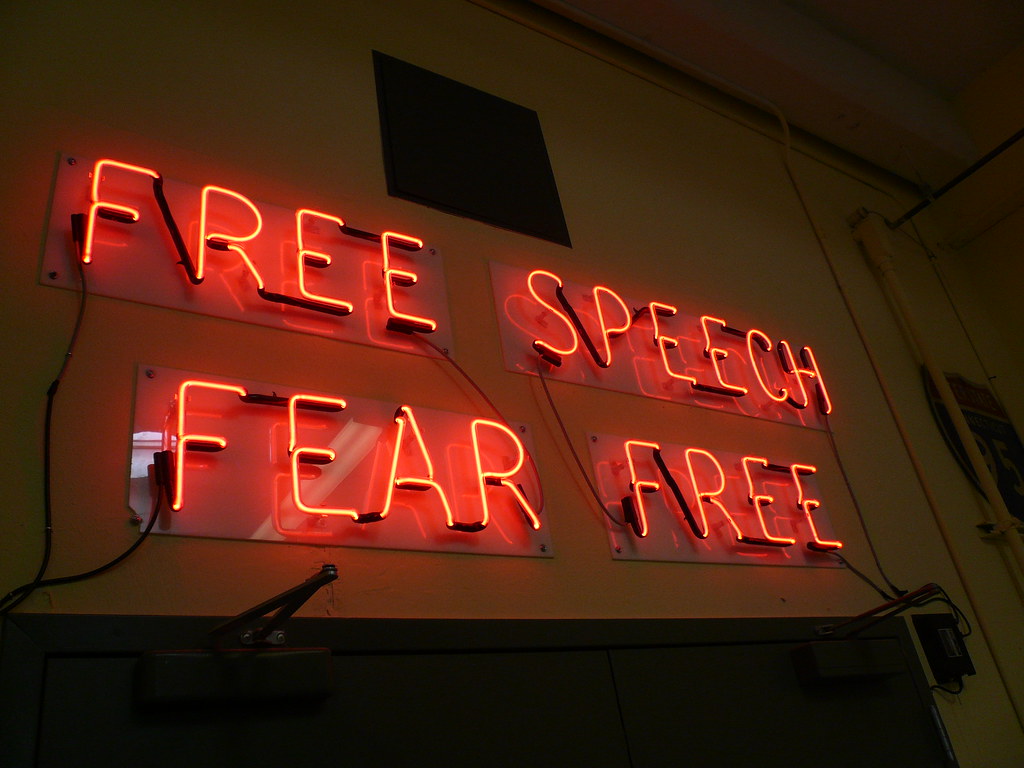The right to speech is an elementary necessity of man. There can be no society unless its members are free to express their opinions and exchange views without restraint.
It is only through the medium of speech that we benefit from the opinions and experiences of others. Society becomes stagnated without free expression of opinion.
ADVERTISEMENTS:
Speech is, also, a means of self-protection. When we are free to express our opinion, we can protest against the tyranny and injustice of others, whether it is the tyranny of government or of any individual person.
The right to speech, therefore, means freedom to express one’s view on general subjects. It means that every individual is free to think and express his opinion in public without any interference by government.
It implies that every individual should be free to criticise the policy pursued by the government. The freedom to think as you will, and to speak as you think, are indispensable means to the discovery and spread of political truth.
But truth alone is no index for freedom of speech, and, as such, the right to speech is also not absolute. The interests of social order and respect for the rights of others require restraints on liberty of expression.
ADVERTISEMENTS:
The laws of the State penalise utterances which tend to corrupt public morals, or defame individuals, incite people to crime, or which spread sedition and endanger the foundations of government established by law.
Such restrictions on the right of speech are not intended to curtail individual liberty. They are imposed to ensure the liberty of others and safeguard the stability of the State. There is some difference of opinion as to the right of speech during war. But it is generally admitted that every citizen must subject himself to greater restraints during national emergency.
Many things that might be said in time of peace may act as a hindrance to war effort and tend to jeopardize the independence and sovereignty of the State. Utterances prejudicial to the safety of the State cannot, accordingly, be permitted so long as the emergency lasts.
Laski, however, does not concede to government the authority to restrict speech even during war. He allows the people the right to express their opinions about the war policy of the government. “No executive,” he says, “has a right to move on its own way, whatever the opinion of its citizens.
ADVERTISEMENTS:
Those opinions must be made known in order to affect its activities. To penalise them at a time when it is, above all, urgent to perform the task of citizenship is fatal to the moral foundation of the State.”
Freedom of speech is a valuable right. Apart from its contribution as a means to the development of social progress, the success of democracy depends upon the right to speech.
Democracy is a government by criticism; clash of ideas and conflict of opinions. Out of this clash and conflict emerges the truth. Criticism of government policy creates an enlightened public opinion. It is, thus, a potent factor for the redress of public grievances.
When freedom of speech is allowed, government, too, possesses the means to benefit from the expression of the views of the public. It is a barometer of public opinion and the government which stifles public opinion prepares for its own destruction.
Laski has aptly summed up this point. He says, “To allow a man to say what he thinks is to give his personality the only ultimate channel of full expression and his citizenship the only means of moral adequacy.
To act otherwise is to favour those who support the status quo, and thus either drive the activities of men underground and, therefore, into a dangerous channel, or to suppress experience not less entitled than any other to interpret publicly its meaning.” But Laski also urges that the citizen has the right “to preach the complete inadequacy of the social order. He may demand its overthrow by armed revolution.”
He does not accept the argument of “reasons of State” and that the preaching of overthrowing the government by armed revolution would mean anarchy in the State. He says, “It is no answer to this view to urge that it is coronation of disorder. If views which imply violence have a sufficient hold upon the State to disturb its foundations, there is something radically wrong with the habits of the State.”
It might be anarchy and, in fact, it is, but, he argues, it does not matter, for the peace in which injustice and tyranny go unquestioned is unworthy of existence. This is an extreme view which no State can permit, not even an advanced democracy, and everywhere “reasonable restrictions” are imposed on the right to speech.
The right to press means the right to publish what a man can lawfully speak. This right flows, ipso facto, from the right to speech. It implies publication of news, ideas, opinions and criticisms subject to the limitations which are imposed on the freedom of speech. The press plays a very important part in disseminating news and views and, thus, helps to create an enlightened public opinion.
Milton has cogently said, “Give me the liberty to know, to utter and to argue freely, according to conscience above all liberties.” A free press is fearless and it is a very powerful and effective vehicle to ventilate popular grievances, to criticise the policies of government and the actions of its officials and, as such, a mighty check on the tendency of the government to interfere with the rights of citizens.
But the press does not serve as a valuable instrument of democracy when it is owned and controlled by the rich and is commercialized. “Democracy is a government by talk, but when ‘money talks’ democracy degenerates into plutocracy.”
It is, accordingly, essential for the success of democracy that free discussion and free criticism should flow from free press to help in shaping a genuine and responsible public opinion.

